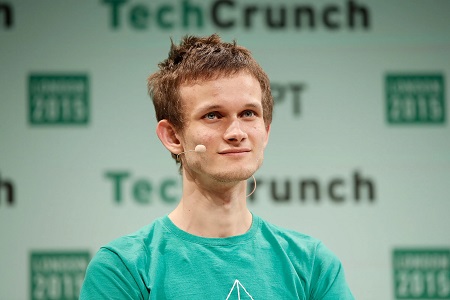During the ETH Seoul 2022 conference, an Ethereum and blockchain-focused event held in South Korea, Vitalik Buterin, co-founder of Ethereum (ETH), presented several ideas that he claims are worthwhile for developers to work on.
The Ethereum creator first urged programmers to create rollups, a scaling solution that entails aggregating transactions into a single transaction and presenting them to reduce costs while boosting speed.
He emphasized the advancement of zero-knowledge technologies and the need for more research on zk-rollups (or zero-knowledge rollups).
Buterin believes that concise non-interactive zero-knowledge proofs (zk-SNARKs), a method of proving ownership of knowledge without sharing it, are just as important as blockchain technology.
He claimed that zk-SNARKs are effective at providing users with privacy and scalability while maintaining security, similar to what blockchains are attempting to do.
Blockchains strive to provide a high level of security at the expense of privacy and scalability.
However, zk-SNARKs provide privacy and scalability, so “build ZK apps,” Buterin advised.
He also advised programmers to pay attention to privacy because it hasn’t received as much attention as scalability.
Notably, there have already been several initiatives to develop privacy-focused protocols. For instance, a social identification verification system for people called Proof of Humanity (PoH) was created on the Ethereum blockchain.
These protocols are becoming more prevalent in Ethereum. They are releasing some attestation at specific addresses that provide information about the person in charge of that address.
Buterin claims that by eliminating duplicate users, these protocols can make airdrops and decentralized government more equitable.
The Proof of Attendance Program (POAP) is a similar initiative that uses blockchain technology to create digital collectibles or badges.
This protocol can determine whether an address belongs to a participant without disclosing the participant’s identity.
Furthermore, Buterin encouraged programmers to consider creating soulbound tokens, which are digital assets that are inextricably linked to the people who own them.
He has recently been vocal about these tokens. After first investigating the concept in a previous blog post this year, Buterin co-authored a research paper in mid-May outlining how non-transferable Soulbound Tokens (SBTs) can enhance Ethereum’s pluralistic environment.
Buterin predicted that soulbound tokens would be capable of recording socially trustworthy associations. Using these tokens for unique airdrops, or “souldrops,” an organization can choose ideal members based on their requirements.
Buterin contends that developers should work to improve public-good funding. He pointed out that Bitcoiners were already using quadratic funding, which is a more efficient way of funding public goods.
However, he stated that there are ways to improve quadratic funding by strengthening the process and ensuring adequate security and privacy.
Buterin also stated that greater decentralized autonomous organization (DAO) governance should be a goal for developers.
He claims that because DAO governance is coin-based, their governance model is either centralized or vulnerable to attack.
Buterin urged programmers to consider non-coin-driven governance solutions, claiming that coin-based governance is “fundamentally wrong.”
Additionally, tools such as soulbound tokens and Proof-of-Humanity can be used to ensure that only genuine, unique humans are involved in governance.
If you would like to read more news articles like this, visit DeFi Planet and follow us on Twitter, LinkedIn, Facebook, and Instagram.
“Take control of your crypto portfolio with MARKETS PRO, DeFi Planet’s suite of analytics tools.”






















